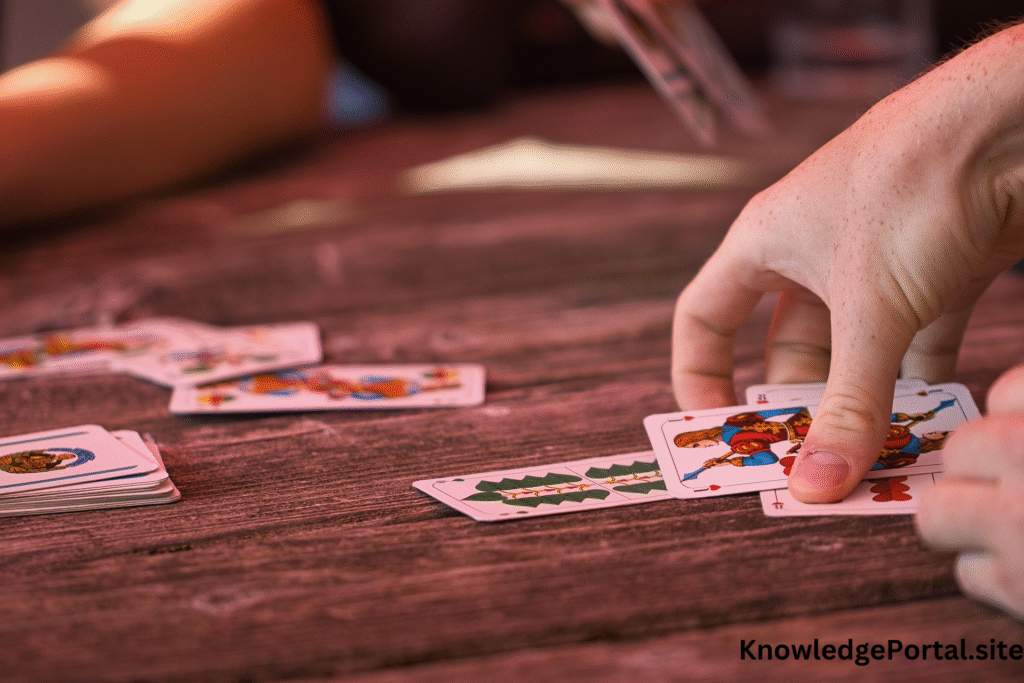Parents, teachers, and guardians are continually looking for creative methods to make learning more interesting in the fast-paced digital environment of today. Using instructional card games is one approach that has become really well-liked. These games make learning a joyful and involved experience for both young and grownups since they mix enjoyment with instruction.
Definitions of Educational Card Games
Specifically created games meant to teach different academic and cognitive skills using cards as the main gameplay element are educational card games. These games have rules, strategies, and gaming mechanisms unlike those of conventional flashcards that help to make the learning process more engaging and unforgettable. They can concentrate on a broad spectrum on math, language arts, science, history, and even social-emotional learning.
Advantages of Educational Card Games 1. Improve cognitive ability
Card games call on players to recall rules, use critical thinking, and make strategic decisions. Key components of cognitive development in youngsters, memory, focus, and problem-solving skills are therefore improved.
2. Boost Your Academic Performance
Games emphasising historical events, language, or numbers help to reinforce classroom knowledge. Math card games, for instance, help with arithmetic fluency; word-based card games help with spelling and vocabulary.
3. Encourage Social Relationships
Many instructional card games are multiplayer, therefore promoting cooperation and communication. Important social skills both inside and outside of the classroom are taught to children in turn, rule following, and team building.
4. Promote Active Learning
Card games include active engagement unlike passive forms of learning like reading textbooks or viewing films. Players have to interact with the material directly, which improves memory of it.
Forms of Instructional Card Games
1. Mathematical Card Games
Building fundamental arithmetic, geometry, and logical thinking skills requires math-based card games. Examples consist of:
Players execute simple operations with four cards to get the number 24.
Math War is a variation on the venerable game of War which participants evaluate sums or products rather than card values.
2. Vocabulary and language card games
These games funfully teach kids new words, spellings, and grammar.
Fast-paced spelling game Scrabble Slam enhances word recognition.
Zoingo! Word Builder is Perfect for first readers, it develops sight word and phonetic abilities.
3. Science Cards Games
Children first learn ideas in biology, physics, and chemistry from science card games.
Children will learn about animal habitats, foods, and behaviours by means of wild cards—animals of the world.
Ion: A Compound Building Game introduces chemical bonding’s fundamental ideas.
4.Geography and History Card Games
These games instruct in historical figures, world capitals, flags, and important events.
Players of the Timeline Card Game must arrange events in chronological sequence, therefore strengthening their historical knowledge.
Combining geography with visual hints, GeoGuessr Cards lets one guess sites all around the globe.
5. Games for Social Skills and Emotional Intelligence
Children who play games with an eye on emotions and social situations grow in empathy and self-awareness.
Totem: The Feel Good Game fosters emotional development and good reinforcement.
Flashcards covering emotional lexicon and coping mechanisms let you quickly feel something.
Best Educational Card Games for Preschoolers (Ages 3–5) by Age Group
Match cards for memory help to improve visual recognition.
Alphabet Go Fish teaches letters and simple phonics.
For Early Elementary (between ages 6 and 8)
UNO Math is a modified form of UNO with arithmetic difficulties.
Playing the Rhyming Words Game helps increase reading fluency.
For Upper Elementary (9–11 years old)
Teaching fractions, decimals, and percentages, Fraction War
The Grammar Police correct punctuation and grammar.
For Teenagers and Adults
Codenames help to improve vocabulary and inference ability.
The Game of Life: Edition for Professionals: Instructs in career planning and financial literacy.
How to Select the Appropriate Educational Card Game 1. Match Learning Objectives
List the abilities or subjects you wish to practise before choosing a game. The game should satisfy those learning goals whether they relate to math proficiency, spelling, or emotional control.
2. Think about appropriate age.
Select games commensurate with the players’ developmental stage. Either too easy or too complex games might impede involvement and learning.
3. Sort Replay Value First
Seek for games providing diversity and several gameplay choices. High repeat value guarantees fun and ongoing education.
4. Choose excellence in design.
The games experience differs much depending on durable cards with vivid images and clear instructions. Furthermore resistant to regular usage are premium materials.
5. Look through reviews.
Examining user reviews could help one understand the game’s performance in actual classroom settings. To get top-rated choices, search terms like “best educational card games for 2nd grade” or “top STEM card games for kids.”
Where one should get educational card games?
Major stores and internet markets both have instructive card games available. Among the most reliable sites are some of:
Amazon provides a large range together with age criteria and user ratings.
Lakeshore Learning specialises in teacher-approved instructional materials.
Scholastic offers games matched for curricula.
Educational insights, well-known for original and interesting learning games.
Do It Yourself Instructional Card Games
Making your own instructional card games can be rather successful whether your budget is tight or you search for a customised learning aid.
Methodologies for Creating Handmade Card Games:
Select a topic. Choose everything from synonyms to multiplication tables.
Create your cards either using downloadable templates or index cards.
Set basic guidelines for turns, cards, and winning.
Play a few rounds to find what works and what requires adjusting.
One do-it-yourself game is Synonym Snap.
Every card consists of a word.
Gamers alternately turn over a card. Two words cry “Snap!,” if they signify the same thing—like “happy” and “joyful”.
The fastest contestant takes home the pile.
Last Notes
For every age level, educational card games offer a lively and fun method of instruction. These games make learning interactive, memorable, and easily available whether utilised at home, in the classroom, or on travel. Modern education has found great use for educational card games in which learning goals are combined with strategic gameplay.
Educational card games are a great and quick way to inspire inquiry, improve academic performance, or just have fun learning.